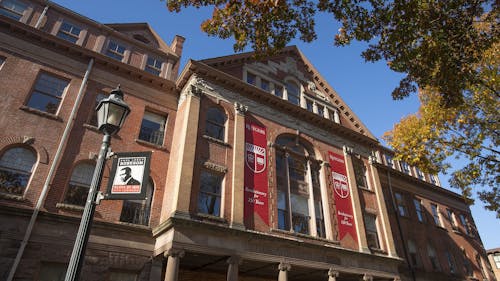Student-organized philosophy conference will discuss migration, political activism, justice

Three undergraduate students have organized "Justice, Philosophy, Migration," a conference that will take place today and will discuss global migration through the lenses of philosophy and political activism.
Deven Singh, a School of Arts and Sciences senior, said that he met fellow conference organizers, Bijan Terani, a School of Arts and Sciences senior, and Oishika Ghoshray, a School of Arts and Sciences junior, in a class on migration ethics.
He said the class was taught by Derrick Darby, a professor in the Department of Philosophy, who will also be moderating a panel of philosophy professors and political theorists during the conference.
“We had a really great time, and we kept connecting our philosophical work to current events,” Singh said. “Our professor had an idea, and he said, ‘I really want to continue this, and maybe we should do a conference about it,’ and all three of us decided that we would get on board and help out. And we’ve just been planning it ever since.”
Terani said that the conference will have two layers: starting the discussion about these topics and then incorporating philosophy and considering its value to the conversation. He said that organizing the conference feels surreal and empowering given the knowledge of the panelists.
“I think that's something I found with doing this conference and working with (Darby): He’s been very empowering, and that's making us feel like our ideas are very much so valued at a very young age,” Terani said.
Singh also spoke about how the event will serve as a dual opportunity to interact with philosophers whose work he often reads about in class and to better see the practical use of those concepts.
He said that one of their goals is to show people the interaction between migration and philosophy and to combine rigorous analysis of the state, policies that guide it, political principles and political philosophy with ethics and personal beliefs into creating a fair world.
In addition, it is important to understand the values and ideas that guide immigration policies in the U.S. and internationally to understand why certain groups of people are given more privilege than others, he said.
“I think (one of) the principles that we should hold as philosophers — and as just students, in general — (is answering) the question of 'why?'” Singh said. “Whether it has to do with racial justice ... especially in terms of transnational migration … we have to be historical, and we have to be principled with how we understand our experiences and the actions of the state.”
Terani also spoke about letting history inform such discussions and understanding the racist and exclusionary narratives that have dictated it. He said that a core premise of the event is empowering voices that have previously been excluded from the conversation.
Students can attend the conference in person from 1:30 p.m. to 3:30 p.m., and anyone interested may attend virtually from 4:00 p.m. to 6:00 p.m. The first portion of the conference will feature Ibrahim Hirsi, a journalist and doctoral candidate at the University of Minnesota, who will talk about the historical aspect of these discussions.
Singh said that along with providing a strong academic perspective on history, Hirsi offers ties to the community, which may attract those who might not be otherwise interested in philosophy to attend the event.
Ghoshray also said that appealing to multiple audiences contributed to generating interest in the conference as she worked on community outreach.
“I think it really brought together what people are interested in — what they believe that we all have in common,” she said. “I think that really helped us get support from different clubs and different people.”
Terani said that since migration is a personal experience for many people of different racial backgrounds, observing these personal elements through a philosophical lens could help guide individuals through life.
“We very much so tried to bring it down to earth in a very humanistic way,” Singh said. “And I think it's succeeded to at least some extent.”
Singh said that in addition to empowering historically marginalized voices, philosophy students have to be proactive in analyzing current migration events, most recently by climate change and eco-fascism, and step in to help people understand what is causing these patterns.
“We all hope that when people come to this conference and they evaluate their personal experiences, they'll see how philosophy is really poised at sort of understanding of those experiences and tying them to other people's personal experiences,” Terani said. “So we hope people from all different types of immigrant communities will have at least a path toward creating a political identity where all of them can have solidarity with each other.”



